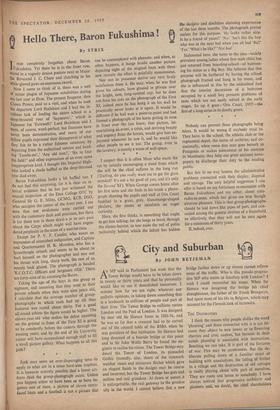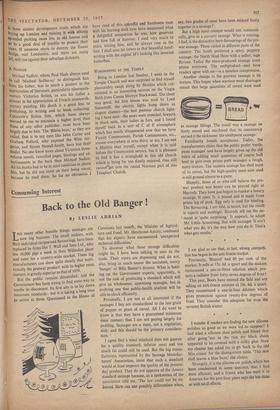City and Suburban
By JOHN BETJEMAN AN MP said in Parliament last week that the Tower Bridge would have to be taken down in twenty or thirty years and that he personally would like to see it demolished tomorrow. I wonder how far we are right, whatever our wsthetic opinions, in taking down something that is a landmark to millions of people and part of their lives. The Tower Bridge to millions means London and the Pool of London. It was designed by dear old Sir Horace Jones in 1886-94, and he was so fat that a crescent had to be carved out of the council table of the RIBA when he was president of that institution. Sir Horace had long dreamed of a bascule bridge at this point and in Sir John Wolfe Barry he found the en- gineer to realise his vision. The Tower Bridge may dwarf the Tower of London, its pinnacled Gothic (recently, alas, shorn of the ironwork weather vanes and miniature fleches which gave an elegant finish to the design) may be coarse and incorrect, but the Tower Bridge has guts and outline and real grandeur. At dawn or sunset it is unforgettable, the real gateway to the greatest city in the world. I cannot believe that a new bridge further down or up stream cannot relieve some of the traffic. Who is this pseudo-progres- sive MP who wants to interfere with London? I wish I could remember his name. When Sir Horace was designing the bridge his chief draughtsman, the father of Sir Frank Brangwyn, had spent most of his life in Belgium, which may account for the Flemish look of its towers.
THE DESTROYERS I think the reason why people dislike the word `planning' and those connected with it is not be- cause they object to new towns or to flowering cherries and civic centres, but because in their minds planning is associated with destruction. Bombing we can take. It is part of the fortunes of war. Fire may be carelessness. But the de- liberate pulling down of a familiar street or building with associations, the felling of timber in a village and the destruction of old cottages is really playing about with part of ourselves. They are roots and home to somebody. I have always noticed that progressive architects and planners and, no doubt, the chief shareholders in those sinister development trusts which are buying up London and ruining it with oblong UP-ended packing cases live in old houses and go to a good deal of trouble to protect their views. If someone starts to destroy the Tower Bridge, real Londoners, and there are many left, will rise against their suburban dictators.
A PIONEER Michael Sadleir, whom Paul Nash always used to call 'Michael Sadlee-ay' to distinguish him from his father, was as much a pioneer in the appreciation of literature, particularly nineteenth- century Victorian fiction, as was his father a Pioneer in the appreciation of French nineteenth- century painting. His death is a great loss to Publishing, to writing and to book collecting. Constable's fiction lists, which have always seemed to me to maintain a higher level than those of any other publisher, must have been largely due to him. The 'Biblio boys,' as they are called, that is to say men like John Carter and Graham Pollard, who exposed the Wise for- geries, and Simon Nowell-Smith, have lost their leader. No one knew more about Victorian three- Volume novels, cancelled pages, bindings and ad- vertisements in the back than Michael Sadleir. All his books had to be in mint condition to please him, but he did not insist on their being uncut, because he read them. So far no obituaries I have read of this splendid and handsome man with his burning dark eyes have mentioned what a delightful companion he was, how generous and how full of humour. I used very much 'to enjoy teasing him, and he always rose to the bait. I shall miss his letters in that beautiful hand- writing with the capital M's looking like inverted butterflies.
WORSHIPPING AT THE TEMPLE
Being in London last Sunday, I went to the Temple Church and was surprised to find myself pleasurably swept along by Mattins which cul- minated in an interesting sermon on the Virgin Birth from Canon Mervyn Stockwood. The choir was good, the first lesson was read by Lord Somervell, the electric lights hung down in elegant clusters—the best postwar church light- ing I have seen—the pews were crowded, lawyers in black suits, their ladies in furs, and I found myself back in a sort of C of E atmosphere which has nearly disappeared now that we have Family Communions, Parish Communions, etc., almost everywhere at nine-thirty or ten. I am not a Mattins man myself, except when it is said before the Communion service, but it is pleasant to find it has a stronghold in this old church which is being far too slowly restored. One still cannot*get into the round Norman part of this Templars' Church.



































 Previous page
Previous page